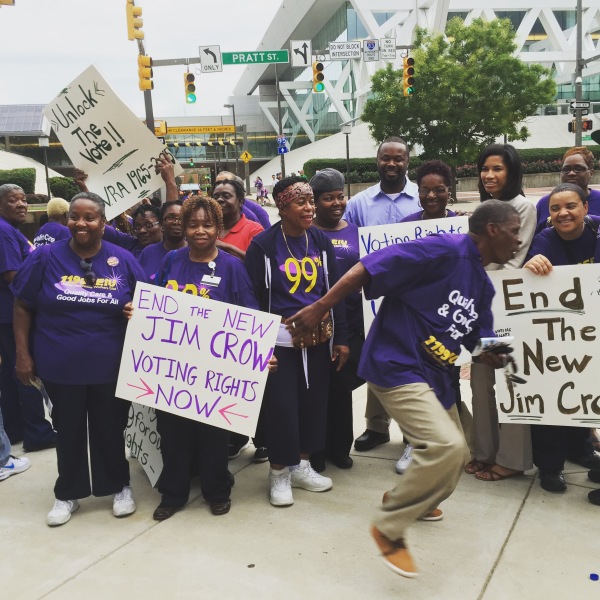Originally published in The American Prospect on August 7th 2015.
—————–
On August 6, the 50th anniversary of the Voting Rights Act, dozens of Baltimore ex-felons rallied and marched alongside community members to protest their disenfranchisement. In May, Maryland Governor Larry Hogan vetoed a bill which would have granted ex-felons the right to vote when they return home from prison, rather than making them wait until after their probation and parole sentences have been completed (some sentences can last for decades). Holding up signs that read, “We Want Taxation with Representation!” and “End the New Jim Crow!” protestors made clear that they understand the racial implications of the status quo. Had Hogan signed the bill into law, 40,000 more Maryland residents—a majority of them black Baltimoreans—would have been able to cast a ballot in the next election. “Override! Override! The veto! The veto!” protestors shouted together as they marched down the street.
The crowd, well over 100 people, eventually gathered around a statue of Thurgood Marshall, not far from Baltimore’s Inner Harbor. “We picked that spot because he’s one of the greatest symbols of justice and fairness,” explained Perry Hopkins, an ex-felon who now works as an organizer with Communities United, the social justice group that planned Thursday’s rally. Fifty-four-year-old Hopkins has never voted.
While Baltimore has made national headlines this year for its police brutality scandals and its spiking murder count, the gathered crowd recognized that these issues cannot be separated from the societal exclusion African-Americans experience every day.
One woman who came to the rally was Robinette Barmer, who has had two children and one grandchild locked up in jail. Barmer has been fighting for ex-felon voting rights all year, and traveled to Annapolis last spring to push for the bill’s passage. “I try to tell ex-cons that their voices do still matter,” she said.
Greg Carpenter, a 62-year-old black man who served 20 years in prison for an armed robbery, also has a 20-year parole sentence. Although Carpenter has been out of jail for 12 years now, he worries he won’t ever get to vote again in his lifetime.
Governor Hogan said that requiring ex-felons to finish their parole and probation sentences before voting “achieves the proper balance” between repaying one’s obligations to society and restoring citizens’ rights. Ex-felons point out that they are both working and paying taxes within their communities, and thus should also have the right to vote.
Social science research suggests that removing voting restrictions would provide positive benefits to both ex-offenders and society at large. The American Probation and Parole Association also says there is no credible evidence to suggest that disenfranchising people who have returned home from prison serves any legitimate law enforcement purpose.
According to the Sentencing Project, a criminal justice advocacy group, there are roughly 5.85 million disenfranchised American citizens with felony convictions, and 2.2 million of them are black. That’s one out of every 13 African-Americans.
The Voting Rights Act was passed in 1965 to end discriminatory voting barriers but the courts have disagreed on whether the VRA should apply to felon disenfranchisement laws. Maryland activists aren’t waiting around for the courts, though. At Thursday’s rally, organizers prepped the crowd for next year’s legislative season where they hope to push for an override. “We need you to show up and come out with us to Annapolis,” said Nicole Hanson, an ex-offender who works with Out4Justice, a group that politically mobilizes ex-offenders. “There’s only 90 days of [the legislative] session, so we’ll need you to make some sacrifices.”
Eighteen states considered loosening ex-felon voting restrictions this year, up from 13 states in 2014. But passing legislation, as Maryland activists witnessed first hand, is difficult. Only one state—Wyoming—ended up successfully loosening its restrictions.
Still, there has been demonstrable progress. The Sentencing Project estimates that nearly 800,000 citizens have regained the right to vote through voting reforms enacted between 1997 and 2010. Last month, President Obama even said that, “If folks have served their time, and they’ve reentered society, they should be able to vote.”
“This is a very peaceful rally, but this issue is personal,” Hopkins said in an interview. “We’re going to flip power, and we’re going to empower. We’re going to show the governor who’s the boss. We’re the boss! We’re the people.”



Did you work at
Reuters a long time ago? You are doing great work.
LikeLike
No I did not but thank you so much for reading!
LikeLike